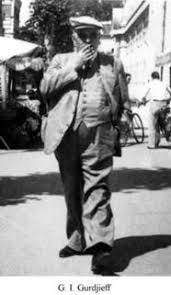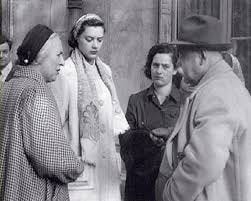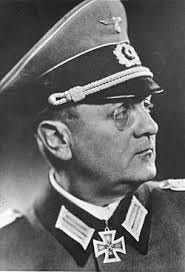On the 10th of June 1940, German tanks rolled into Paris.
Many of the inhabitants naturally decided to flee, but not an old Armenian man who lived in a small flat on 6 rue Colonels-Renard.
His name was Mr Gurdjieff, seeker of Truth, something of a trickster, and some said a ‘madman.’ In many ways, he fulfilled the archetype of the oriental with mystical powers, and it has always been challenging to separate the man from the myth, something he seemed to encourage.
Amidst the chaos and uncertainty of wartime Paris, George Ivanovich Gurdjieff remained an enigmatic figure, unyielding in his peculiar philosophies and practices. He was a man who stood apart, embodying resilience in a time where despair dominated the landscape. While the city's streets echoed with the tread of soldiers and the whispers of resistance, Gurdjieff's little sanctuary on rue Colonels-Renard became a haven of unconventional wisdom.
Gurdjieff’s tiny flat was less than a quarter of a mile as the crow flies from the central command post of the German occupation. This was a time of fear, and as the torture of the occupation dragged on, the deprivation and hopelessness increased. Truly a climate of fear.
Gurdjieff tells us in his curious second book, “Meetings with Remarkable Men’ how his grandmother always told him to do the opposite of what other people do, to not be mechanical. In the book, he describes dancing at his grandmother’s funeral while others mourned or wept!
Known for his teachings on self-awareness and the pursuit of higher consciousness, Gurdjieff attracted individuals yearning for meaning in a world suddenly devoid of order. His methods, often unorthodox, encouraged his followers to confront their fears and transcend their mechanical tendencies. Through stories, movements, and seemingly bizarre rituals, Gurdjieff challenged the very fabric of conformity that had bound humanity for centuries.
Despite the physical proximity to dangers that loomed ever closer, Gurdjieff's presence radiated an air of imperturbable calm. Strikingly, his refusal to flee, his choice to remain rooted in a city under siege, mirrored his central philosophy: to act consciously, not reactively. For Gurdjieff, the occupation was not just a political circumstance but a test of inner fortitude—a crucible where individuals could forge their true selves.
Gurdjieff set about generating intentionally the energy of abundance, the missing element in this traumatised city, as mankind practised again ‘reciprocal destruction.’ Ever the sly man, and using his skills of persuasion, Gurdjieff managed to stockpile huge amounts of food and exotic ingredients. These included Armagnac and chocolates. These were served up at lavish banquets and were part of his teaching that went beyond mere words into being itself, a righteous exchange of energies.
Gurdjieff always said that times of upheaval and change were good times to ‘work’ on oneself, to remain aware and conscious. This is certainly something I have found true.
Among Gurdjieff’s many unique ideas was the so-called "Science of Idiotism," a concept that, despite its humorous name, delved deeply into the psyche and aimed at fostering self-awareness and inner development. This was central to his teaching in Paris at this time.
The science of idiotism was not an insult or a judgment but rather a playful, symbolic framework to describe the various types of human personalities and their tendencies. He categorised individuals as different "types of idiots," using the term to denote the imperfections, quirks, and blind spots that everyone carries. These were not meant to demean but to acknowledge the inherent flaws in human nature—flaws that, when consciously confronted, could lead to growth and transformation.
Gurdjieff identified several "idiots," each representing a specific archetype or behavioural pattern. They ranged from ordinary idiots to cosmic idiots, with each level symbolising a deeper or more expansive form of foolishness. Rather than categorising people as fixed entities, Gurdjieff's classifications served as tools for self-reflection. By recognising one’s own "idiot type," individuals could begin to understand their limitations and work towards greater consciousness.
For Gurdjieff, the science of idiotism was intricately tied to his broader philosophy of confronting one's mechanical tendencies. He believed that humans often operated on autopilot, reacting to circumstances without genuine awareness or intention. By identifying one’s personal "idiocy," one could start to see how these automatic behaviours control their lives and impede true self-development.
The science of idiotism was part of Gurdjieff's broader teaching method, which combined storytelling, physical movements, rituals, and seemingly paradoxical exercises. These practices were designed not just to educate but to disrupt habitual thought patterns, stirring individuals into a state of heightened awareness. Idiotism, in this context, was a playful yet profound way to explore the nature of human folly and its potential for transformation.
What made Gurdjieff’s approach so compelling was its paradoxical nature. While acknowledging the absurdities and contradictions within human beings, he did not advocate for their eradication. Instead, he suggested embracing these imperfections as stepping stones for inner work. Idiotism became an avenue for humility—a reminder that self-knowledge begins with accepting one’s flaws and seeking to transcend them. In this way, the "idiot" becomes a seeker, aware of their foolishness but striving for wisdom.
Gurdjieff's science of idiotism remains a testament to his ability to challenge conventional thought and evoke curiosity. It encourages us to look inward, not with judgment but with curiosity and openness. In a world that often prizes perfection, Gurdjieff’s philosophy reminds us that growth stems from acknowledging and working with our imperfections. Idiotism emerges not as a mockery but as an invitation to begin the profound work of self-awareness.
As with much of Gurdjieff’s teachings, the science of idiotism defies simple explanation, blending humour, depth, and mysticism in equal measure. Yet its core message endures: wisdom begins with the willingness to confront one’s foolishness—and in doing so, to find the path to a higher state of being.
As always, accounts of this time from those who were there are fascinating, but fail to convey the energy that must have been present. I have experienced such energetic transmission with groups of seekers, unusual individuals and certain places, but these must be experienced and felt rather than read about.
In 1944 the noose was tightening on the Nazi Occupation.
American troops had landed in Normandy and were steadily making their way toward Paris. The Germans planned to leave Paris in flames! This would have obliterated the great monuments of human culture. Dietrich von Choltitz was known for his ruthlessness and oversaw this forthcoming apocalypse.
Somehow it never happened. The moment receded, and Paris was left intact.
Was Mr Gurdjieff’s energy and will involved in this?
Like many things with Gurdjieff, it will remain a mystery.
For twenty- years each morning, before bed and upon waking, I would close my eyes, come to rest inwardly and intone silently, ‘Remember yourself Everywhere and Always.’
Next year, it has been decided to embark on something of a pilgrimage.
I shall visit Gurdjieff’s grave in Fontainebleau and toast him with some Armagnac. He has been such an influence on my life.
Next, it will be Chartres and that stunning cathedral, then on to Lourdes and finally Aix en Provence.
We are going to Inter-Rail.
Again, as always, thanks for reading.
David
@thebrazieroftruth













Thanks again Philip. Mr Bob Bon was the name the children in Paris gave Gurdjieff, he always had sweets in his pockets to give them - generally Bon Bon’s. I know an ridiculous amount about him and the Fourth Way so there will be more posts in the future. The challenge is my library is currently scattered but should be brought back together in October when the outside office is built. Poor Katherine Mansfield, it was a bit late when she arrived at the Priere. She was a real talent. Gurdjieff was blamed for her death, but she loved her time with him.
'Mr Bon-Bon'... hmm? Smile.
Gurdjieff was / is a curious luminary figure but not lodged as if in thin air. You have sent me looking again; there was Jeanne de Salzmann and an Institute for the Development of Man. Those continued conversations in Paris from 1941 were brave, considering the Nazi curfew. I see there is a book of transcripts, not that easily obtained apparently just now. Seriously, there is the interaction with Buddhism? Any thoughts? (Curious aside, I see Katherine Mansfield died of TB cared for as a guest at the Institute near Fontainebleau in 1922.)
Best wishes for inter-train and your paying respects.